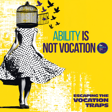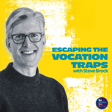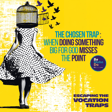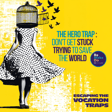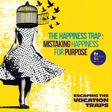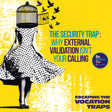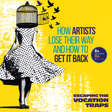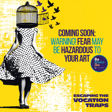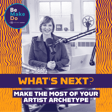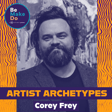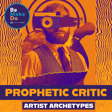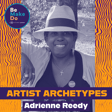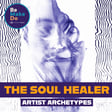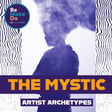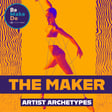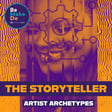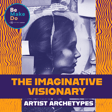Introduction to Be Make Do Soul Makers
00:00:11
Speaker
Hey, it's Lisa and Dan. Welcome to the Be Make Do Soul Makers podcast, where we explore art making and creativity from a place of deeper calling and encourage you to become who you are created to be, make what you are created to make, and do what you are created to do.
Season Focus on Motivation and Archetypes
00:00:28
Speaker
And this season, we're talking about motivation, success, and fulfillment by exploring the six artist archetypes, the maker, the mystic, the imaginative visionary, the storyteller, the soul healer, and the prophetic critic. Yes.
Understanding Creative Motivations and Traps
00:00:44
Speaker
And we have created this really fun tool to help you become really conscious of what motivates and excites you to make what you are created to make.
00:00:54
Speaker
Because we're all different, right? And we probably, none of us fit neatly into one category. But thinking about your deeper motivations can help you build a creative path for your work and life that is fulfilling and avoids getting caught in traps around striving for some idea of success or career that might not really fit you.
00:01:16
Speaker
In addition to exploring these archetypes, we'll be talking with creatives about how their unique motivations help them overcome challenges and find sometimes unconventional paths to a fulfilling life in the arts. Wanna know what your artist archetype is?
Exploring the Imaginative Visionary Archetype
00:01:32
Speaker
Head over to soulmakers.org backslash quiz and find out. In our previous episode, we explored the imaginative visionary, not the imaginary visionary. That's right, Dan. I kept saying that.
00:01:45
Speaker
We looked at the motivations, challenges, and what's necessary to thrive. If you haven't had a chance to listen, definitely go back and do that when you get a chance.
Interview with Eric Loxmo
00:01:55
Speaker
So on this episode, we'll be talking with Eric Loxmo of Outback Presents in Nashville, Tennessee. Eric's archetype is definitely an imaginative visionary, and I can't wait to dive into this conversation with him. Let's do it.
00:02:18
Speaker
Eric is the vice president of marketing at Outback Presents, the leading independent full-service promoter of live entertainment based in Nashville. Eric began his work in Washington DC politics serving as a congressional press secretary, a speechwriter, head of communications for the National Endowment of the Humanities. Then he served as the vice president of strategic partnerships and outreach for Walden Media in Los Angeles until 2008 when he co-founded Different Drummer, an unconventional marketing and publicity firm.
00:02:48
Speaker
Then, he was part of Aspiration Entertainment Ventures, which has been instrumental in the success of dozens of films, including Won't You Be My Neighbor? He's the author of several titles, including Upended and the Revolutionary Communicator and Different Drummer, Bold Thinking for the Rebellious Creative. He and his wife Monica have three children and live in Nashville, Tennessee. And I am really excited to talk with Eric today about what motivates an imaginative visionary. Hi, Eric. Hello, Lisa. Good to see you again. Yeah, you do. A minute and a half.
00:03:22
Speaker
but since the very, very early days in DC with the brewing culture email. I feel like you gave me a tour back when your space was just being formed. Okay. You just converted it and you gave me a space and I've always been amazed at what you're trying to do. I have done and I quit being not just DC
Art's Role in Bridging Divides
00:03:42
Speaker
but the entire country and world with interesting takes and resources. So thank you.
00:03:47
Speaker
Wow, well, thank you. I mean, you were, youre I'm not even sure how we got connected to begin with, but the work that you were doing and the conversations and questions you were asking were just such a touch point and encouragement to me, like, okay, there's other people, there's people that are doing it, you know? Trailblazing. The questions have not been answered, let's just say that. It has been since quite early 2000s. I think we met because We were trying to create a space where you had suits and artists left and right, people of all different perspectives, at least gathering around some type of artistic work, because that became the the centerpiece for conversation when everything else was, even though this is 23 years ago, still things haven't changed, they've gotten much more heightened, but the arts, as we know, we talked about before, have a way of bringing people together in unique ways.
00:04:43
Speaker
Yeah. and i Honestly, I feel like even at the time, i was and that was where the seeds of all the things was being born. and I felt like I was seeing, this is really interesting. Something is happening even with artists and owning this sense of, you know the arts are really this path to deeper truth. and and We really want to dig into that. Even seeing that within the art world itself outside of anything else and and really wondering like what would it look like for ah the church or Christians to come alongside these people and say, yeah, you're onto something.
Generational Shifts in Art and Spirituality
00:05:19
Speaker
And we want to be in conversation. And I i think it has been a 20-some year
00:05:24
Speaker
like gestation period that maybe even just now is the time where some things are starting to pop out of soil. Yeah, i you so I'm 1973 baby and I think about. Me too. Are you really? Yes. We will not do the math. We don't need to do that now. um But that that age of we grew up with um parents, grandparents had a certain perspective on what you do and what your what your mission and meaning is and how you find that and what's your how you make a living and have an impact. And we're also the generation that grew up with
00:06:08
Speaker
gaming and with the rise of movies that became the centerpiece of cultural conversations, you know certain movies everyone saw, right um still had limited channels cable. And then you went into, we're the first, we I think my senior year was the first time we had um online access. So I do feel like this, our and our generation, our age saw so much of this transitioning and the democratization of the arts and a break from our parents and grandparents where where we finally had our ourselves, and then, of course, generations behind us are saying, I don't have to choose between my spiritual practice, my belief, and my art and output, and where I go to do that. I can go to Paramount, I can go to Pixar, and be very ah fulfilled and connected in line with what I believe, and it's not setting that on the table or leaving it at
Artists' Philosophical and Spiritual Engagement
00:07:05
Speaker
right There's a long way to go. There's there's there's a long way there's a lot of ah lot of progress with a lot of things still left to do. Yeah, yeah it's interesting you talk about like when we were growing up in the the cultural atmosphere. i I, as a teenager, kind of on one hand, felt the very strong that the culture war coming from the conservative background that I had, which had even changed since I was a kid to when I was a teenager. was I remember wrestling with that. um But then feeling like I was seeing in so many movies and hearing in music, like i I'm turning around and saying, but I'm hearing, like, they're talking about this. They're longing for these deeper things, these spiritual things. And Why aren't we paying attention? Why aren't we engaging in this way? And why aren't we listening as certain things are being reflected back? Why are we fighting about what the content should be and engaging more deeply in it
Audience Participation and Artist Collaboration
00:08:08
Speaker
together? And that's, for me, it's been a lifelong quest. You know, that's just, I can't let this stuff go. I'm like, let's, let's get in there. Let's get in there.
00:08:16
Speaker
Oh, gosh, yes. I think you nailed it because the I went into DC in political role and wanted to be a speechwriter and did that, press secretary, and I worked in politics. But the reason we created this separate space is because, like you, I was beginning to understand common grace. And I think that's a really underdeveloped concept in the spiritual formation of ah people, of old and young. I think it changes everything when you understand that you can look at a a song by Noah Khan and you can say, that rings true. there is There is something about that line that is absolutely true, even if, and I don't know where he is, but even if he doesn't share my own beliefs or my lifestyle or my anything in common,
00:09:09
Speaker
There's something that when you listen to a song, you go to a gallery, you read a book, you watch a movie, a show that you're tapping into something that is otherworldly. yeah And Common Grace basically, as you know, says that God's creative input, imprint and input is on us and in all people and all humans yeah and in creation.
00:09:31
Speaker
So we're always glimpsing and catching glimpses of what is true and good and beautiful. And i until you and have those eyes to see, I think you either get really confused or you get really angry yeah because but they don't believe or they don't share this or or then it's more confusion of what I want to stand up and applaud that dancer. But I now feel shame or guilt or something else here. So that was a funny point for me. And I think that's this that's Sometimes I'm disappointed that we're not further along in that regard of thinking. you Well, I think it is confusing because the depth of conversation maybe hasn't or is maybe emerging. I would like to to imagine that because the other side of that is observing people who ah make it to superstardom, who for one reason or another either have grown up as Christians or become Christians and then are, celebrated, we've got we've got one. um But the most support that we can give is to you know get them baptized, get them to a church on Sunday and say that you're a Christian, yeah but not the the support system to come around the side to say, okay, what does that mean as a creative person who I believe it is, it's a priestly and prophetic role. I do believe it requires a lot of depth to do, to make art well. And you see it you know just like we're talking about these artists who, whatever their background, you know, you you listen to interviews with actors or musicians or writers, like they can, you know, what they're thinking about philosophically and spiritually often is so deep and complex. So the need for
00:11:16
Speaker
like theological understand that art is a theological tool or it can be. you know it's so It's part of the way that we process what it means to be human. It's more than just a label. like there really is yeah It's tough to go into that space and and just have it be another label that you
Community Support for Artists
00:11:35
Speaker
you know I've always felt there's there's a two roles. You have the audience role and there's a certain role that we all play and it's not passive. And that's that's tended to be the the consumer mentality is right that we just take it in and and accept it or purchase it, click it, whatever, consume it. And then you have the artist over here. And I think you and I show this belief that there are some faults on both sides. I look at the audience and say, if we could ever have you be a patron and ah and a participant,
00:12:12
Speaker
And what I think of um practical ways that looks like, especially in and House of Worship would be, and this was, this was floated out in Denver. In 2018, I put this out to some artists and I felt the room and a lean forward, not because I had anything brilliant to say, but I think there was so much longing for practical expressions of what audiences can do beyond consumption. And it was about this question of what if you gave 1% of your time, your space and your money,
00:12:40
Speaker
to artists and that as an institution, as a house of worship. And the numbers are are so large because you have, I don't know, 300,000 house of worship in the US. But part of that was the idea of time is 1% of your year is a weekend. And whether you're a family or individual or institution of business at house of worship, to set aside a weekend to say,
00:13:04
Speaker
We're gonna do some intentional film festival. We're going to have artists come up to our, and pray for them. We're gonna have them display their work. We're gonna have workshops. We don't have that intentionality as individuals, institutions. And I think that's what artists are looking for is, okay, just don't be passive. Be with me. If you love my work, if you love what I'm doing, be more involved. And then on the other side, artists need to think, they love the,
00:13:34
Speaker
ah the preciousness of being an artist at times, of something special. and and As a four on the Enneagram, I love when we're all so special. But you know they need to open the space up more for that patron collaboration with the audience. Yeah. and I think there are so many models within artist social practice and artist community engagement. There are a lot of things that I think could be explored and and borrowed. but as i I feel like part of where we're having to start with what we're doing with Soul Makers and Be Make Do is to have the conversation about why it matters. you know Why is it important what to to raise the
Fulfilling Artistic Calling vs. Commercial Pressures
00:14:19
Speaker
awareness of the level of impact that the the media and culture and
00:14:25
Speaker
ah everything around you affects and shapes not only you but your neighbors the world which then in turn shapes you and not even understanding i think you know that the commercials you're hearing repeatedly you know that started in some artistic brain somewhere way back in the chain you know Like and the music from that came from, you know, where it's that, you know, what Mako Fujimura was talking about a long time ago about going upstream and and ah putting cultural artifacts into the into the water upstream as opposed to responding downstream. But I still think that that is really hard ah for people to grasp and then even for artists sometimes
00:15:07
Speaker
to take the responsibility of that without the like, I'm special, you know, like, sometimes there's also a reaction to like, I don't want to make, you know, as a Christian, I don't want to make myself special. I'm not, I'm not special. I'm not anything, but I really am, you know, to to take it seriously. No, it's a job. Like we have a job to do. We were put here for a reason. Yeah. Two.
00:15:31
Speaker
I think if you're a Christian who happens to be an artist, or how we want to phrase that, because I do worry that Christian is a marketing term now. It allows the audience to understand. It's a way for marketers to say, and labels and producers to say, okay, this is for you, and has certain connotations. So we know that. I don't know if that's a tired argument, but it's an old argument that the movies that I worked on and care about were in that middle space, and they were,
00:15:59
Speaker
they were invitational to both because they had things that were in that common grace and they were just profound, resonate with both audiences. But if you're and if you are an artist who is trying to live out your faith and you feel compelled to, let's say, do something that's more of a worship, let's say, music, well, you're kind of stuck into a system that is really around profit, which nothing all of that, but you start leaning into things where it has to be measured.
00:16:32
Speaker
So if it's making money, but then it has to have, if you want to talk about making impact, we then we tend to look at that from a, as an investor or from a, is this useful and worthwhile? Does it move the needle in politics and does it move people into conversion? And the moment you start saying that an artist, your job is really two things. You have to move the culture into a certain so certain certain place, that's your agenda, or you have to move people into a certain place. I think you put a huge burden yeah on the artist and you're really putting them into a pigeonholed view of what they can do.
00:17:12
Speaker
So that that's where i don't I love the fact that we're democratizing and we're more independent, but you can hear even now for the last few years, artists who are who are just increasingly frustrated with the system. Yeah, so yeah that's so tough.
00:17:29
Speaker
Very hard. I don't envy the artist today, but artist is very broadly defined, right? The creative person who's who's never doesn't have a title song, doesn't have a producer credit, but is in the um editing bays, and is designing the next building building in in the higher rise of Chicago. Those are those are so highly creative, talented people.
00:17:55
Speaker
And we tend in this conversations to think of only those that have the credits. There's so many that you you're working with that are just faithful, creative. They want to do with meaning. They want to bring beauty. They want to bring something that's as impact and last. Yeah. And we tend to forget those. Yeah. See, because it's you know, you're talking about the pressure that's on the artist and the the problem is like art doesn't work that way. You know, you can't control what the outcome or the impact of something that you create. So starting from that place is a setup for failure in general or so feelings of failing failing or almost like winning the lottery or something.
Daily Practice and Creative Purpose
00:18:39
Speaker
it just So I think that's where understanding art making
00:18:45
Speaker
From my perspective, as it was intended as a spiritual tool, as a spiritual language, like you can make art do whatever you want. You can speak however that comes. But it was intended for this thing. you know it it It does speak to people on a that like rings true level. And the only way that you can do that authentically or effectively is to really say something, you know, to really create something. And so then like we at Soul Makers, we talk about um calling, kind of trying to define that as three parts. So not just what you do, you know, the things that you do or the things that you accomplish, but really also thinking about
00:19:28
Speaker
um becoming who you were created to be and making what you were created to make as well as doing what you're created to do. So spending time in each of those three things, like it matters. Like I think it's Walter Sorf who says that there's always a world behind the work. So attending to the world behind the work is your primary job.
00:19:52
Speaker
and then attending to the way that you make the daily practice, the proficiency, the way that you and interact with people. Like wherever you are, even if you haven't saved the money to get on the bus to go to Nashville or whatever yet, like you are living out your call living out your purpose fully if you are really attending to those things on a daily basis and then doing whatever it is God's calling you to do wherever you are right now. And that'll change over the course of a career, especially for a creative because you never know where you're going to end up. I certainly didn't think I'd be here when I started out. you know So I think that's some of it. I absolutely love that because it it is
00:20:39
Speaker
And maybe it's our social era and the pressure of of we're looking and seeing success, perceived success, that there's a rush that happens. There's an urgency that yeah that I think creative people feel that, gosh, I'm not there yet. I've got to do this. And it's and is that human being versus human doing. And you're you're tapping into the ah world behind the work is is where are the artists getting their rest and replenishment? And Mako, you mentioned him earlier, it talks about recreation, recreation, that is the same word. And that, are you are you doing things and reading things and taking the moments to build the capacity to be creative? You cannot give what you do not have. right And then your're your your process, you talk about the the way of doing things is so powerful because
00:21:35
Speaker
Again, we're all prone to to have this short-change cut corners approach to anything we do. right We're in a race, we feel like we're in a race of limited time or that person's success has now limited my potential. um And I think this is where there's lots of headlines that could be, I'd love to have the entire, you know, this sounds arrogant, but like the entire church in in front of you to say, okay, here's the things we gotta worry about. And one of them is,
00:22:04
Speaker
this a short-term vision for what you're doing. It's like two years out. It's the next quarter. It's the next election. It's the next whatever, next trend, instead of thinking, okay, well, what does this look like in 10 years, 50 years, 100 years, when we're all gone?
Creating Eternal Truth through Art
00:22:22
Speaker
And you look back and think, well, the great artists, a lot of them are creating for the moment, but and they may have no idea that they were gonna create something in the last 500 years, but there is something that that surfaces or lasts than most of the stuff I see coming out of, especially in the Christian world of art, will be forgotten in two years. see and that's you know I think ah when I was reading a long time ago, reading N.T. Wright's Surprised by Hope, and i and I was recently reminded of this this idea of being part of the new creation, but the idea that what we create now has eternal significance. It will be around.
00:23:02
Speaker
forever, if it is, you know, if it's good, true and beautiful, and it kind of ah contributes to that ethos. Like, I really think about, I i want to believe, and I want to encourage, you know, the artists or the writer who's like riding in their basement, and they they they do one great thing, and they think nobody's ever going to read it. And, you know, 50 years from now, somebody picks picks it up, and it it shifts that person's life, or it shifts the world, you know, you just never know. And Yeah, i I love that thinking beyond that two years because it's so easy to to fall into that and think from a business. i mean I think it's important for us to be able to say it out loud and encourage people on a consistent basis to not think that way because I know I struggle with that all the time. like It's not big enough. It's not good enough. It's not snapping yet you know as opposed to just saying no,
00:23:59
Speaker
I'm responsible for creating and creating well, and God will do what God will do with it. And it really is a different way of being, but it's hard. It's hard to hold on to that.
00:24:11
Speaker
So good, yes. Because I found this and in my and you know my creative world as tends to be kind of the producing side of the marketing producing that something's completed and that needs to get out to the world. That's where I've had in my career. as yeah a It's a film, it's a piece of music. You're the guy everybody wants to be best friends with.
00:24:33
Speaker
I don't I know that because you know marketers are the first ones to be blamed if things don't go well. Gotcha. Never the content. No. um But in you know what I've seen is that that part of what we miss as um as creative people is that we look at the final product, we did not look at the process and what we learned and how we treated people along the way.
Focus on Creative Process Over Product
00:25:01
Speaker
I just was talking to a filmmaker who was to tell me horrific stories of a film that people have seen that people were saying, oh, this is you know this is gonna such an impact. that's gonna It made money. But behind the scenes, the way these these producers and director were treating everything from their grips to their PAs to their catering, it just was an awful environment. And I think you have
00:25:27
Speaker
Yes, your work is seen and is visible and people respond to it, but the people you're treating along the way and how you're treating them and how you're... how you're your crew, if you're on a larger production, or if you're having a going to a venue and you treat the venue staff horribly, like that is a part of of your art, is loving people well and serving them as they serve you and what you're creating. And I think we missed that. Like, oh, it just puts on the screen or on the um the Spotify list. And it's all the things behind it, all the process, all the people that are along the way.
00:26:01
Speaker
Yeah. And that's so in the the search for my personal fulfillment or my personal goals, it's so easy for that to get lost and you know our own traumas and demons and all that kind of stuff pop out in those high pressure situations. you know without I think that's where you know the focus on developing our that becoming who we we're created to be, but then also having a support system of people who are challenging us to say, I don't see what you're saying, you know, your mouth's talking, but I don't see it, you know, to really be able to to challenge, challenge us in those ways to say, there's something bigger here.
00:26:48
Speaker
Yeah, yeah, the community side of that, you know, Nashville, where I am now, it has been a story, a storyville for a long time.
Nashville's Collaborative Creative Community
00:26:58
Speaker
A lot of publishing here on the book side. There's a lot of, there's been a lot of music, of course, that came out of the crossroads of America. Everyone started their tours here is how Nashville, you know, I had friends who were in New York and they're their bus would start in Nashville, go to pick them up in New York and come back to Nashville. They'd go start their tours. But there's there's something about this two hours from everywhere by flight type of notion. The fear is that you're going to lose the collaborative spirit of the city, which you in music especially, you'd sense that there's a lot of like
00:27:35
Speaker
working together and rooting each other on and and so showing up for shows and mending your voice and your and there's ah there's just an underground there that is super special. And I don't know if that's the same thing in other cities. LA, which I lived, it is it is built upon a ah perception of success and two to offer yourself up to someone who's trying to rise up is a is a diminishing view of your career. And in New York, I think there's lots of challenges there because you're at a different level and pace in financial world and parts there. Other cities may have it. Austin, I think some has some of that, but that's what's special. When you have a community that's saying, um we're gonna end this together and we're there is a feeling that they're against the labels. there's ah there's a bit of
00:28:29
Speaker
of a locking arms around the independent artist who's trying to make it. um But yeah, the community that's that's just rubbing shoulders with you and your in your work is is so, so important.
Societal Success vs. Personal Fulfillment
00:28:42
Speaker
Yeah. Well, that makes me kind of want to dive deeper into this conversation about motivation and creating a pathway for a career and thinking about success because I you know ah The question often pops up around you know somebody saying, like i want to I want to show in and this gallery, or I want to sell more of my work, or I want to do it. But I hate marketing, and I'm terrible at business, and i and those are you know important questions. But there are classes and books and people you can hire. you know those There are ways to address that, um not to say that it's not hard or a mystery, because it is for me. Social media is a mystery.
00:29:24
Speaker
but um But like to take take a minute and step back and ask why. like Why do you want those things? Do you even really want that? What do you really want? like Do you really want to be famous? Or do you want to act in great films and have great roles? Because that's not necessarily the same thing. like Do you want to work consistently and you know as an actor? That was my background anyway. You know you could say, like I got to the point where I realized I don't really want to do everything it takes. I don't have i don't have that personality.
00:30:01
Speaker
to do what it takes to try to get in that place. What I really want to do is be the lead actor in a play that's really freaking good. you know and so That brought me to ended up in DC and starting my own theater company. you know like some of I think there is a little bit of questioning. ah There's not one path to success, especially for creative people. And I think it's very, I almost feel like that's a radical thought for a lot of people because we have such clearly defined lines of what it looks like to be successful.
Joy in the Creative Process
00:30:35
Speaker
um But success and fulfillment as an artist aren't necessarily the same thing. but what What do you, I mean, I'm sure you've seen tons of stuff. That's in every single person's mind and heart, I think is, is um you know what does it look like? and When is enough or when do I feel most fulfilled? And when do I feel in the flow as a creative person? And is that enough or is there something that I'm that i'm missing or that is this gonna last, this feeling of fulfillment?
00:31:04
Speaker
And I think there's plenty of stories of ah ah people who are successful who long to be back with their guitar in a studio, have just created that first song that no one else has heard and it just is magic in the room. And they're now performing in front of tens of thousands of people, but there's a magic about the unknown, the undiscovered,
00:31:28
Speaker
the process, all that. And it happens in every every entrepreneurial's garage or basement or in a lab for chemists. It happens in certainly and in every sector, every city. There are people who are imagining something and there's like, this is working or we found something, let's play off that. and And that feeling doesn't always last. And then the question is, well, how do I make money on the how I make a living? And we have to change our, and this is, there's lots of good thinking and podcasts and writers about this, but what does that look like to be fulfilled and make a living? And I think as you get older, you have the benefit of saying, well, I really, these are things I enjoy. These are things I'm good at.
00:32:17
Speaker
um I just want to do those things and I don't really, the ambition has changed. There's a saying that, I'm sure you heard this somewhere, if in the 20s you think you can do everything, in the 30s you think you can do nothing, you can do everything, and then in the 40s you think you can do one thing and in the 50s you actually do it. It resonates because in my 20s, I was the worst because I was ah strive I'm a striver, and so I have to embed the word abide from John in my being because I would break down
Evolving Perspectives on Success
00:32:53
Speaker
doors. I would push open anything for a chance of to make something, because I think a lot of it comes from my own past. of And I think there's a number of people in our age group who feel this, where I feel fulfilled when I perform.
00:33:05
Speaker
but I have some success. At last, oh, it goes away. yeah I feel low. I need to hit that again in my career cycle or in my work. And so in my 20s, I was pursuing everything to feel whole and feel alive and feel like I had worth. And then 30s too, and then just getting older, I'm like, i I could do that, but that sounds exhausting and miserable. yeah yeah You said about your about, yeah you know, doing something major on some Broadway show, you know, exciting, the thought is amazing. And then you're thinking, I really want that that's a lot of work. Yeah, no. And it's not just, you know, I think it's not just retired, I think we realized that
00:33:53
Speaker
Ash, there's something more beautiful in a conversation around a meal that is actually far more satisfying and lasts longer and deepens us. um So I'm with you. it's yeah It may be age. It may just be a right sizing in the world of we've all been taught that if you hit these things, you will feel this way. And there's enough now that we realize that is not true.
00:34:18
Speaker
Yeah, yeah. Yeah, I had a ah conversation with myself a couple weeks ago or a month or so ago. I was supposed to go to a big event and I couldn't go because I was sick. And I just, I was so upset all night long that I couldn't go because I should go for so many different reasons. It would, you know, such a good, I need to keep this network active. I need to do this. And I just, I had a dream that night where I just thought, you know, I'd really like to be involved with people who actually just really care about what I'm doing. you know I've done a lot of things where I'm trying to be available for other people and and ah help out. and And some of that is thinking it'll lead to another opportunity later.
00:35:02
Speaker
um But it was so far outside my sphere that it never materialized it into anything. And I'm grateful for those relationships and those opportunities, but you don't have to do everything. It isn't a constant striving and that I'm with you. I've started to see I started to get into this place of prayer of just saying, you know, God, you know you know, and I know that I'm not enough for this task ahead. And so I always struggled with the just do your best. Because I'm like, well, if I do a little bit more, I can do better, you know, maybe I could do better. I don't know where that line is.
00:35:38
Speaker
and being able to not to just stop like way back from that and say, I think that's just all I can do
Finding Significance in Small Contributions
00:35:46
Speaker
tonight. And so God, you know, take the rest and seeing how how actually effective that really, really is is get starting to give me a lot of freedom that I don't, like you really I really don't have to strive. Like it's not, the world is not gonna end because I stopped trying to run it.
00:36:07
Speaker
In fact, nobody will notice. not of the new yep the planet i mean That is the mustard seed in a different way that our talent, and there's plenty of this in the parable of talents too, but it the mustard seed of of um our smallness and what we actually can control and what we can contribute, it is so small.
00:36:28
Speaker
um We think we're bigger than we are. We think we have a greater influence. And it's helpful to know that no one's thinking about us right now. We're not we're not on the minds of ah thousands or millions of people, for sure. Hopefully on the minds of a few people who care about and love us. yeah But that, ah the smallness is helpful in that it gives you a sense of significance in the small things, like you said earlier. um The daily habits.
00:36:57
Speaker
of um doing the things that are small and never seen are truly art and does contribute in great ways to what you're doing that's more public. And im um I love the people who are... it's a very it's And you have many people like this I'm sure in your life where you're around them and there's just a contentment about the work they're doing. yeah And I need that because as a marketer, it's always about, well, we got to go further, more measurable, what's success, what's winning.
Challenges of Imaginative Visionaries
00:37:36
Speaker
no And the business side of that is important, of course, but there's something beautiful about being on people who are just like, I wrote a great poem this year. Yeah.
00:37:48
Speaker
and I don't think it frustrates me because I i ah want that. It makes a little bit, um examines my own ambitions in striving. Yeah. Well, I noticed um I did look at the the quiz. You took took our archetypes quiz and I saw that you you scored in the imaginative visionary kind of realm, which makes sense. Like being about ideas and you know trying to, you can see something, the potential for something to happen and wanting to to make it happen. And i i kind of I'm resonating in that space as well. And I just wonder like, I think part of that trap
00:38:27
Speaker
Is feeling like this is gonna sound really funny but it was this year i've really started to realize. hum I can't do everything can i like i i'm having to admit that to myself but there is a part of my brain is like every single one of my ideas is brilliant and it should be able to happen.
00:38:49
Speaker
And the idea of letting go of that, you know, not every great idea is going to to happen. And maybe one, like you were saying, I love that like at 50, you're actually going to do it. I feel like that's where I am. It's like if I could just focus on one and then also have the humility to say,
00:39:09
Speaker
My gifting is in these ideas and see how things connect and I have to partner with other people To make some of the actual pieces fall into place um And that means being able to do less, think in bite-sized pieces. but But then that is what then leads to the ability to, all right, we can chill a little bit because I'm not trying to run six races all at the same time. It's just one and we're walking together. do you like what What are your challenges with kind of the way your brain works? Oh gosh, that's like an eight-part series.
00:39:48
Speaker
my I'm a professional plate spinner, I have been. I've learned that that is impossible to do, and it is it dilutes me. It dilutes the things that I can put my hand on. And I have a great envy for Takea Steph Curry, greatest basketball player and and shooter in the history of the game. Well, his whole mindset was,
00:40:14
Speaker
I wanna be the greatest shooter ever. He knew what he had to do to do that, like 10,000 shots a day. yeah And that became his world. And so he's he's singular focused on that one thing. And I think some people have the benefit of early on going, this is what I was made to do, this is my passion, my love, and I'm gonna do everything I possibly can to see how far I can go. No, he could have had a thousand reasons he would not be the greatest player, greatest shooter ever. But he had a very early on a singular focus and my my brain is,
00:40:44
Speaker
is always like, wow, like you, that's an interesting idea.
Strategizing Creative Projects
00:40:48
Speaker
And what I've learned to do is, okay, you know Walt Disney had his brother, Roy, who was his compliment in building the world of Disney. And Walt was the dreamer, the imagineer, and they had a thing called Disney's drawer, Disney drawer. And and he would have an idea, they would write it down, put it in the drawer, and Roy would go through later on and look at it,
00:41:14
Speaker
And he may keep those ideas there, but he pulled the ones that actually had some significance or subtraction or possibility. And I think that's what I'm doing is I'm cataloging. My ideas are still there and I have, we all probably have 50 notebooks in our bookcase of ideas. And it's amazing how you write it out, you spend a week later and you go back and go, that was a terrible idea.
00:41:37
Speaker
And my so my process has gotten really refined on ah mostly looking at a reverse engineering of an idea. I look at i look at a project, I go, okay, I'm gonna look at the very end and I'm gonna work backwards and see what would it take to make that successful. And for the most part,
00:41:54
Speaker
Very few people do that in their creative work. They're not thinking of, okay, in five years, where do I want to be and how would I get there if I could really have, you know, a lot of times you don't have any input or a creative control, but if I could, how would I get there and be strategic? and And maybe the thing that I've shifted my career most is helping a bunch of different types of projects people think through the strategy of their creative output.
00:42:21
Speaker
What are the things that they can't do on their own that we can help I can help get them to a place? that is and Ultimately, it's what is their greatest potential. that Whatever happens, whatever that means, it it could be great success, it may not be. But what I don't like is seeing artists that have something and it's stopping because of some limitation that is actually overcomeable.
00:42:45
Speaker
work that you can overcome. and it's And it's usually it's because they don't understand business and they're they're good at at they're what they do. They're good at art and creative, making their work. There's a whole lot of part of that, as you know, that you need people who are going to say, I'm the Sherpa, you know, I'm going to help guide you through. um So that's where my brain and and my creativity and my art, I guess I would say is is simplifying, bringing clarity,
00:43:14
Speaker
um thinking of strategic ah process and and what is the end game and how do you launch well and how do you create moments that that are going to leave an imprint on the world and ah leave audiences better when they leave your work. yeah That's kind of my artistic contribution, not being an artist myself.
00:43:36
Speaker
Well, what do you say to artists that you're working with when they are trying to map out that career? like you know Are there any kind of words of caution or words of wisdom or words of encouragement that you give to people who are maybe maybe start starting out probably with within an artistic career to really think about and consider?
00:44:00
Speaker
and That's a very common question. they're They don't ask it directly like that. they ah they are they're They're looking for that. And the one thing that I have found is that a creative person has their main work. So if I'm a musician, I make music. But I guarantee that person has creative surplus that's not being tapped into. And I meet them all the time. They're a musician who has a screenplay. There's a musician who has an idea for a podcast. There's a musician who has an idea for a product. They want to have a this or that. And it's they're never talking to me about music. They're talking about their world, their creative world.
00:44:39
Speaker
And I think that's, I call it downtime. Downtime is not rest or punishment or recreation. It's actually the creative surplus where when you're offset or you're off stage, there's other things that you're thinking and dreaming of.
Balancing Creativity and Business
00:44:54
Speaker
And it's really important for artists to not ignore that.
00:44:58
Speaker
because they they they may have their their brand or their world is bigger than they're just their single thing. And their managers and agents are telling them, this is what that matters. But it's like having a cup of a cup in front of you and you're dumping water into it. Well, you've filled that, but you're keeping pouring water and it's just going somewhere. a And I really, I encourage you more artists than ever, when you meet someone who's just got a creative brilliance,
00:45:25
Speaker
I mean, there's so many things that they can do that are not going to take away from their core passion and work, but that would create a bigger opportunities, partnerships, sponsorships, ah new products, new revenue, new connections. like And yeah very rarely do you if you find a creative person who's just got one thing. That's important. And then I think it's it is going back to a team of people who are with you no matter your ups and downs. In fact, the ones that are with you when you're down is is so important. this Nashville is what they call a city of unfinished songs. and that's That's where you need the community to say, listen, we all have unfinished paintings, unfinished scripts, unfinished songs. That is okay. um That's part of it and we're with you in that. and
00:46:21
Speaker
yeah there's going to be maybe a potential that one of those does get completed someday and we can celebrate together. Yeah, I think that's really beautiful. And that give me an idea it would be fun to do like a Saturday, like everybody come in their pajamas or something bring your unfinished, unfinished song and finished script and we just kind of play together. Yeah, yeah, exactly. It's It's ah you know unfinished business. That's the last one. We're all going to leave this world unfinished. Yeah. But I do love that too, giving the permission to focus on those other areas too. ah Because I even think from a career standpoint with the making money, you know sometimes there are things that you really feel called to do artistically or want to do artistically that may not make any money at all.
00:47:10
Speaker
And that's okay. like that really is There's no shame in making money other ways so that you can do the things that that are inside of you. which you know That's been a path for artists since the beginning of time.
Overcoming Isolation through Community
00:47:24
Speaker
It just feels very foreign, I think, in a time where it seems like you should be able to make money out of anything.
00:47:30
Speaker
you know You should be able to go online and make money of it out of anything, but it's okay if you don't make money. like that's not really i mean Obviously, you have to take care of yourself, but it's not the um the only path for artistic success. I think that's why's so important because ah you know the truly artist ah true artist has to create no matter what. Yeah.
00:47:52
Speaker
you know, that's they're compelled to, they feel the sense they're not whole unless they create. Yeah. And so if they have to find other ways and other means to re support that and, and you know, who knows, you never know how life turns and shifts and opportunities come and go. And isolation is the worst thing that that's one thing that I think is the most dangerous thing is living in isolation on every level is where things go really really sideways. yeah but Artists want the times to be in isolation and that is not where they need to be. There's time for that, but that needs to be more of intentional retreat. But I think you what you're doing is saying, come, join us, don't hide, don't play with your demons. and They wake up with you and they and they speak to you in your ear and they say, you're not going to do anything today. You're worthless. No one cares.
00:48:49
Speaker
And for someone like you and your community to say, no, we're all we're all going, we're going somewhere. yeah And it may be a stumbling through a windy path that we're going someplace and joining us that is absolutely beautiful.
00:49:02
Speaker
Yeah, that's one of the things that I've seen repeatedly in our little groups that we have, these spiritual collectives, is the power of hearing multiple people say, oh, I was really struggling with this this week. Wait, what? You struggle with that too? And it's like a magic spell that's just broken. It's like, oh, okay, I thought there was something wrong with me. And clearly, that's not the case. But you're right, that isolation can be deadly.
00:49:28
Speaker
Oh, yeah. My wife was in some small group of women and and they're going around talking about some things. And you know, it's fine. It's very surface. And she said, does anybody else hate their husband today? It's like everyone's just like, me too, me too. And I think that's, ah yeah, on me but I also just, you're right. You speak it out and say, um anybody else just feel like I've been in a dead season for four seasons?
00:49:54
Speaker
Yeah. And then that that all the lies that go around that get broken and you can find a way through.
Art's Response to Societal Challenges
00:50:02
Speaker
Yeah, it's so important. Well, what about you, Eric? what do you What kind of motivates you to like the underneath thing that sort of motivates you to do what you do and how do you keep that alive? Because I'm sure there's things that come into to block that sometimes or temptations to go in this direction or that direction. But wouldnt how do you keep alive the motivation for for doing what you do?
00:50:25
Speaker
Yeah, I think what's come down to more recently would be I want to be useful and I want to be tempered in the things I believe to be the best way or the best for whether that's society, whether that's best for the church, whatever that looks like. it's It's tempting to be a stronger voice and be more dogmatic and be more resentful of those that aren't, or those that are leading, or a little bitter of who's leading the the charge, I should say, or leading way. Because I have very strong opinions about where we need to be and what's what's going off the rails. oh And I want to do that in a way that is not shutting people out, but is inviting them into something more beautiful and better. yeah And by when I do that, and I feel like I do that through, it could be a film,
00:51:20
Speaker
It could be we put up we did a ah play to screen of The Hiding Place and an adaptation with The Rabbit Room, came to theaters, went nationally, internationally, did fine. But it was this attempt to say, here's a new way of looking at an older story. But also, this is actually really a beautiful story, it has a lot of meaning, and it doesn't have to be a formula or have certain outcomes that are measurable in terms of like This is part of the cause to stop or to save democracy or whatever that is, whatever side. um But just offering better things and finding new ways to say things that can resonate with people. I have found by doing that in small ways, you people come to you and I've i've found my people. And that's that's probably the most satisfying is, well, you tend to feel like you're alone again. You find that people are with you and they share that.
00:52:18
Speaker
And then you want to do work with them. So I'm motivated by wanting to be useful, wanting to find those people and together create something that does move the needle back to where I think it needs to be. I think it's going to be a very hard few years coming up. The artist is going to be the is the first responder, tends to be the first responder, um but there's going to be a real disregard of the artistic world.
00:52:44
Speaker
oh Increasingly, I think it's going to get harder and harder. But in as we know, as we talked about earlier, there's little remnants. Yeah. In the ruins, there's people.
Supporting Emerging Artists
00:52:54
Speaker
And that's exciting because that's where, again, small things happen that can be yeah absolutely monumental. And I want to be a part of that. That's what motivates me. I have some big dreams still that doesn't go away. But it's more of, yeah, what are the what are the things that are not just chasing the moment that are or a momentous, have momentum for other things I care about.
00:53:19
Speaker
Wow. I'm as you're talking just so grateful to have you be on the podcast and that people can hear you speaking and hear hear you speaking your heart because I think as as a lot of people are off on their own in their own little little world and especially if they're just starting out or they've had bad experiences to we can get in our minds that it's me against everyone else and I have to fight against and to hear voices that there are people, really people who are in in the space of being a producer or being a manager or being a marketing person or being a casting director or whatever are actually looking for people to help. You know you you want you want to create something and um to hear that there are people who are their friends on the other side you know who want to be in partnership
00:54:16
Speaker
and to be encouraged to be bold enough to ask for help, to reach out to people, to have confidence, to share, you know, here's what I'm thinking or here's what I want. That it's not, yes, there's a lot of rejection within the entertainment industry, but it's not necessarily personal rejection. And it's it's just about working together to get to something that's going to work.
00:54:39
Speaker
you um so i just I really appreciate your voice because it's a really encouraging inviting voice that I think people need to hear too. I'm so grateful. If i anybody is listening, watching in your world, they're not alone by any means.
00:54:54
Speaker
um I think we're still disconnected. I think we're still feeling like, gosh, I wish I could, and I always feel like I am i am open. All my ideas are for our giveaway. um My time is as well, and I think that's the season of life I'm in is, um ah you know, I wanna contribute so that, and this is, I'll leave this, this is a line that um a friend of mine who's ah who's a showrunner,
00:55:23
Speaker
He, this is years ago, he said, I don't think our generation, speaking to me, is thoughtful enough, creative enough, prayerful enough, um deep enough, spiritual enough, all the enoughs to do the things we wanted to do. I think it's generation coming up behind us. And when you say that,
00:55:41
Speaker
if It's a posture of, okay, well then what is my role? if i if i And I do believe that. I don't believe we're nearly creative enough as the generation is coming up. Well, it's going to our role is going to be to break the ice a bit, create a path for them, and to be around for them to say, hey, did this ever happen to you? And at this point in in the marketing career and all things I'm doing,
00:56:03
Speaker
I'm more useful in saying don't do that instead of saying do this because if someone's saying do that, they're, they are completely misguided and and spinning tails because no one knows what to do. But we, as you're older, that you get to say, Oh, I wouldn't do that. That's not a good house. So I'm happy to help anybody anywhere that is looking for a friend on the way. Wow.
00:56:27
Speaker
Eric, thank you so much for this conversation. I i just really have enjoyed talking with you. There's all kinds of other conversations i'd I'd love to have, so I'll reach out to you later. But I really, really appreciate your time and your generosity um and just that you are working in the space that you are you are working in and doing what you're doing.
00:56:49
Speaker
You've you've really been an encouragement um and an inspiration to me over over this 20 year time And and I feel even more so just after getting to talk to you now. So, thank you. Oh likely at least Thank you for your doing and I love it. Love all the there's not just a idea It's thought of pump thought upon thought of what you're building and it's that's deep and dense and real so thank you for for marinating and that for so many many years, but also just hours of thinking and praying. So thank you.
00:57:23
Speaker
Thanks for listening to Be Make Do, a Soul Makers podcast. All links and resources are located in our show notes. Wanna know your artist archetype? Take the quiz at soulmakers dot.org backslash quiz.

